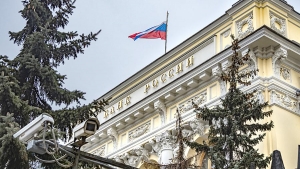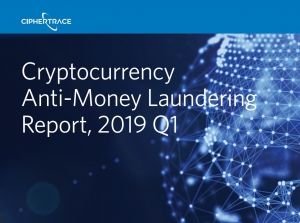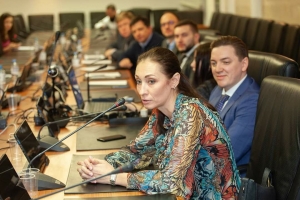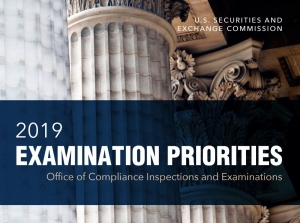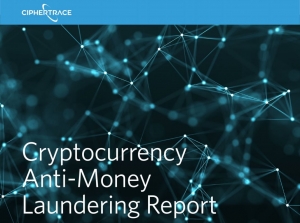Блог
Displaying items by tag: AML
LAWYER APPRECIATED THE PLANS OF CENTRAL BANK TO CHANGE THE GROUNDS FOR BLOCKING ACCOUNTS
Natalya Manuylova, a forensic expert and teacher at the Moscow Digital School, commented on the Bank of Russia’s plans at the request of Izvestia to clarify the signs that could cause banks to consider their clients' actions suspicious.
The list of reasons for blocking an account has not been changed since they appeared in March 2012. Earlier, on February 17, it became known that the Central Bank proposes not only to introduce new criteria, but also to exclude some of the more than 100 existing ones, according to which banks recognize transactions as doubtful.
“The Bank of Russia revised the list of unusual transactions, excluding a number of signs, and added new signs taking into account the realities of the financial market. It is worth noting that the list of unusual operations only orient banks to pay special attention to operations that have signs of unusual. Unfortunately, quite often confused are signs of dubious operations and operations that have signs of unusual ones”, the expert added.
Regarding the qualifications of operations with digital and virtual assets, much will depend on the qualifications of bank employees, Natalya Manuylova added.
According to her, if bank employees do not have enough qualifications, then Rosfinmonitoring will replenish with information about operations that are not related to dubious ones.
Moreover, the market will resume pressure on the business to provide documents not related to the operation, threats to block customer accounts, delays in operations.
“For example, the symptom in section 11,“ The transaction is related to the acquisition or sale of virtual assets ”should be adapted for banks in the existing risk management system. The Bank should develop its own additional criteria for qualifying such an operation as “doubtful,” for example, the amount of the transaction, the business reputation of the counterparty, the counterparty’s bank, and so on. Considering that a number of signs are quite common, I think that the Bank of Russia is waiting for a rather large number of requests from both banks and customers, but here it’s already in the form of complaints, ”concluded the forensic expert.
In February, Russian Prime Minister Mikhail Mishustin, during a meeting with the head of Sberbank German Gref, said that the bank’s technologies and services would be used to simplify the life of Russians and to create a state-owned digital platform.
Source: IZ.ru
QATAR BLOCKS CRYPTO ASSET SERVICES
The world is divided into parts regarding the cryptocurrency environment. Some advocate a ban on digital currency, others offer only some restrictions, and some states impose a complete ban on cryptocurrencies. The motivation for the ban and restrictions on cryptocurrency is the fight against crime and money laundering.
So the State of Qatar has added to the list of countries with a ban on the circulation of cryptocurrency. A statement by the Qatar Financial Center regulator states that "Virtual Asset Services cannot be held in or out of QFC at this time." It stated that the ban included “anything valuable that replaces a currency, can be sold or digitized and can be used for payment or investment”.
Simplecoin, a Netherlands-based cryptocurrency 'mining pool' set up to enable collaborative discovery of new virtual currency coins, and Chopcoin, a Bitcoin gaming platform, announced they would be shutting down before the EU Fifth Anti-Money Laundering Directive (5AMLD), came into effect in all EU Member States on 10 January 2020.
The 5AMLD requires providers of crypto platforms and wallets to identify their customers for anti-money laundering purposes.

Source: Intelligence for the Global Adviser and Wealth Manager.
RUSSIAN FEDERATION'S MEASURES TO COMBAT MONEY LAUNDERING AND TERRORIST FINANCING
Paris, 17 December 2019 - The Russian Federation (Russia) has an in-depth understanding of its money laundering and terrorist financing risks and has established policies and laws to address these risks, but it should enhance its approach to supervision and prioritise the investigation and prosecution of complex money laundering cases, especially concerning money being laundered abroad.
The Financial Action Task Force (FATF), the Eurasian Group and MONEYVAL, assessed Russia’s anti-money laundering and counter terrorist financing (AML/CFT) system. The assessment is a comprehensive review of the effectiveness of Russia’s measures and their compliance with the FATF Recommendations. This includes an assessment of its actions to address the risks emanating from UN and domestically designated terrorists and terrorist organisations. The report does not address the justification that led to the domestic designation of an entity as a terrorist or terrorist group or organisation.
Russia recognises that it faces significant money laundering risks as a result of the proceeds of crimes committed within the country, in particular those related to corruption and its role as both a transit and destination country for narcotics trafficking. A national risk assessment, complemented by in-depth knowledge of relevant law enforcement agencies, has allowed the country to identify and understand its risks, including terrorist financing risks. Russia’s legal framework appropriately addresses these risks and the country has formal policies in place, supported by strong domestic co-ordination and co-operation, to combat money laundering and terrorist financing. However, the country needs to address gaps in its ability to freeze, without delay, assets linked to terrorism, financing of terrorism and proliferation of weapons of mass destruction, and ensure that this freezing obligation extends to all natural and legal persons.
In general, Russia cooperates with foreign counterparts, including through more than 100 international co-operation agreements with its financial intelligence unit, Rosfmonitoring. Authorities make excellent use of financial intelligence, based on a wealth of collected data and analysed with sophisticated technologies to contribute to money laundering and terrorist financing investigations. While the country has prioritised getting money back for the victims of crimes – around EUR 816 million per year – it needs to focus more on the investigation and prosecution of complex money laundering cases, especially concerning money being laundered abroad.
Russia has strengthened its oversight of the banking sector and has now mitigated the risks of criminals being the owners or controllers of financial institutions. However, deficiencies in licensing remain and the sanctions for banks that do not comply with AML/CFT requirements are not effective or dissuasive.
In general, financial and certain non-financial entities such as accountants and auditors, have a good understanding of how their services could be used to launder the proceeds of criminal activity or terrorist financing, but given that Russia is a significant centre for mining precious metals and stones, this sector’s understanding of risk is not in line with the country’s risk assessment.
Since its last assessment in 2008, Russia has strengthened its understanding of the money laundering and terrorist financing risks it faces and has developed a robust legal framework to address them. The country has taken a number of actions that have delivered concrete results. But, the country needs to address the areas of weakness this report has identified.

The FATF adopted this report at its October 2019 Plenary meeting.
OPERATORS OF INVESTMENT PLATFORMS ARE OBLIGED TO ORGANIZE MEASURES TO AML/CFT
From 01.01.2020, a new entity will appear on the financial market - the operator of the investment platform. In accordance with subparagraph 7) of clause 1 of article 2 of Federal law dated 02.08.2019 No. 259-FL "On attracting investments using investment platforms and on amending certain legislative acts of the Russian Federation" the operator of the investment platform is a business company created in accordance with the legislation of the Russian Federation, carrying out activities to organize investment attraction and included by the Bank of Russia in the register of investment platform operators.
It is worth noting that from 01.01.2020 the amendments to the Federal Law of 07.08.2001 also come into force. No. 115-FL "On combating the legalization (laundering) of proceeds from crime and the financing of terrorism" (hereinafter - Law No. 115-FL), according to which:
1. Operators of investment platforms become the subject of Law No. 115-FL (Supplement to the first part of Article 5 with a new fourth paragraph of the above law);
2. The operators of investment platforms are entrusted with the obligations specified in Article 7 of Law No. 115-FL, including the application of measures to freeze (block) money or other property in accordance with the requirements established by subparagraph 6 of paragraph 1 of Article 7 of Law No. 115- Federal Law.
3. The operators of investment platforms have been granted the rights specified in Article 7 of Law No. 115-FL, in particular:
- simplified identification of investment platform operators with respect to customers in certain cases, namely: when concluding agreements on the provision of investment assistance services involving investment using the investment platform for an amount not exceeding 100,000 rubles, provided that all settlements are carried out exclusively in non-cash form on accounts opened with a Russian credit institution;
- an assignment of the identification procedure to third parties - on the basis of the contract to entrust the credit organization with the identification or simplified identification of the individual customer, as well as the identification of the client’s representative, beneficiary and beneficial owner.
4. The internal control rules of the Investment Platform Operators are developed taking into account the requirements approved by the Central Bank of the Russian Federation in agreement with the authorized body, and approved by the head of the organization.
5. Qualification requirements for special officials responsible for the implementation of internal control rules, targeted internal control rules, as well as requirements for training and education, identification of clients, client representatives (including identification of the sole executive body as a representative of the client), beneficiaries and beneficial owners are determined in accordance with the procedure established by the Bank of Russia.
Please note that non-compliance with the requirements of Law No. 115-FL entails the prosecution of an official and organization on the basis of Article 15.27 of the Code of Administrative Offenses of the Russian Federation. The consequences of non-compliance with the requirements of the AML/CFT legislation May result in criminal prosecution.
For questions regarding the organization of work on the implementation of Law No. 115-FL and training, write to This email address is being protected from spambots. You need JavaScript enabled to view it. or This email address is being protected from spambots. You need JavaScript enabled to view it..
CRYPTOCURRENCY ANTI-MONEY LAUNDERING REPORT - Q1 2019
Report for the first three months of the current year CipherTrace Cryptocurrency Intelligence (April 2019).
Cryptocurrency Thefts, Scams, and Fraud Could Tally More than $1.2 Billion in First Quarter 2019.
Criminals stole more than US$356 million from exchanges and infrastructure during the first quarter of 2019. Among these losses, exit scams—which CipherTrace is considering the implosion of QuadrigaCX to be one—robbed cryptocurrency users of nearly US$195 million. On top of these numbers, the New York Attorney General’s Office revealed what they allege is a fraud involving the loss of $851 million by a major cryptocurrency exchange, Bitfinex. Cyber criminals also developed ingenious new techniques to drain millions more from user accounts and wallets. These thefts only represent the losses that are visible. CipherTrace estimates the true number of crypto asset losses was much higher.
46% Increase in the Number of Cross-Border Payments from US Cryptocurrency Exchanges Over the Last Two Years.
CipherTrace research conducted in Q1 revealed a major hole in the current cryptocurrency regulatory fabric with respect to cross-border payments. An analysis of 164 million BTC transactions revealed that cross-border payments from US exchanges to offshore exchanges increased from 45% from the twelve months ending Q1 2017 to 66% in the twelve months ending Q1 2019. This is significant because according to the International Consortium of Investigative Journalists, “$8.7 trillion, 11.5 percent of the world’s wealth, is hidden offshore.”
Once these payments reach exchanges and wallets in other parts of the globe they fall off the radar of US authorities. For now, it is uncertain if these cross border inter-exchange payments trigger the FinCEN requirement that “MSBs must keep a five-year record of currency exchanges greater than $1,000 and money transfers greater than $3,000.” But experts recommend MSBs retain tax ID/SSN for these transactions.
A Significant Wave of Regulation Is Coming to the Cryptocurrency Economy.
Ultimately, thieves and scam artists will need to launder the cryptocurrency stolen or scammed in Q1 2019. Furthermore, this will require innovative new ways to cash out, and turn all that tainted virtual money into clean, spendable fiat currencies. And they will also need to get it done under the much more watchful eyes of government regulators and banks as a tsunami of tough new global anti-money laundering (AML) and counter-terror financing (CTF) regulations will roll over the crypto landscape in the coming year. As of April 2019, 17 countries plus the European Union within the jurisdiction of the Financial Stability Board had at least some regulation or standard-setting bodies dealing with cryptocurrencies. These bodies will be responsible for implementing regulations that enforce FATF policy and AMLD5.
In light of the huge losses suffered by users of QuadrigaCX, regulators in Canada and around the world are rethinking controls on the internal business practices and security operations of exchanges. In addition, regulators are beginning to recommend bans on privacy coins, as criminals are coming to prefer these new anonymous altcoins to bitcoin because they are more difficult to trace. Banks also continue to face problems coping with the coming wave of regulations as they increasingly recognize there are undetected cryptocurrency operations that are using their fiat payment networks and customer accounts. Plus, courts in some countries have ruled that banks must do business with licensed cryptocurrency companies.
Crypto Crime Evolves and Expands from the Virtual to the Real World.
The previous year’s crypto crime spree was dominated by major external exchange hacks around the globe—with the biggest occurring in Q1 2018. However, in the first quarter of this year, insiders, extortionists and scammers attempted a more diverse range of crypto crimes. As just one example, kidnappers in Norway demanded nine million euros (approximately US$10.3 million) ransom in Monero, a privacy coin, for a billionaire’s wife, who has not yet been returned. There were also two large insider thefts/misappropriations (QuadrigaCX and Bitfinex). This shift suggests that security against external hackers at exchanges is maturing under the pressure from regulators and customers to take necessary measures to prevent losses.
The geopolitical implications of cryptocurrencies also took center stage in Q1 2019 with countries competing to attract crypto businesses and foster related economic growth. Conversely, overt attempts to evade sanctions by hostile nations show that economic adversaries recognize the money laundering and terrorist financing potential of crypto assets. On March 6, 2019, the UN Security Council reported North Korean state-backed hackers successfully breached at least five cryptocurrency exchanges in Asia between January 2017 and September 2018, causing $571 million in losses.
Q1 2019 Crypto Crime Highlights:
- Thieves and scammers stole more than $356 million from exchanges and users.
- Customers suffered losses of approximately US$195 million when Canada’s major cryptocurrency exchange, QuadrigaCX, imploded after the CEO mysteriously perished in India, allegedly along with the passwords to virtually all of the exchange’s assets. CipherTrace analysis casts severe doubt that this was anything other than a theft, fraud, or foul play.
- On March 26, the New York Attorney General’s Office brought suit against the parent company of Bitfinex and Tether.
- The AG claimed Tether had failed to disclose a secret transfer of funds from the fiat pool of funds supposedly backing tether, which converted tether from asset-backed to debt-backed unbeknownst to tether holders.
- Bitfinex allegedly lost $851 million. The source of the loss was a Panamanian payment processor also used by QuadrigaCX.
- Iran announced the imminent launch of its long-rumored Crypto Rial, a state-backed stable coin developed with the express purpose of circumventing political sanctions and overcoming sanctions-related restrictions by SWIFT.
- The Russian Duma approved international use of the domestically developed SPFS as a ‘SWIFT alternative’ for cross-border payments in an effort to avoid political sanctions.
- The French government issued a report recommending a ban on privacy coins.
- The UN published the findings of a private report that concluded North Korean hackers looted $571 million from five cryptocurrency exchanges in Asia.
- Courts in some countries forced financial institutions to bank crypto asset businesses.
- The Bank of Mexico reportedly proposed banning financial institutions from transacting with crypto exchanges, citing money laundering and terror financing risks.
Source: CipherTrace.
IMPORTANT APPROACHES TO THE ORGANIZATION OF WORK ON IMPLEMENTATION OF AML/CFT LEGISLATION REQUIREMENTS
On March 27, 2019, training for students of the 7th stream of the BCL (Blockchain Lawyers) supplementary education program was completed at the Federation Council.
As part of that, the audience in a round table format along with the first deputy chairman of the Federation Council Committee on Economic Policy, the founders and teachers of the course, as well as invited experts discussed the regulation of the digital economy and modern technologies in Russia.
Natalya Manuilova paid special attention to the following issues: that the Bank of Russia had several new and important documents aimed at fulfilling the requirements of the legislation in the area of countering the legalization (laundering) of proceeds from crime and the financing of terrorism (AML/CFT). Important on the approach to the organization of work in this direction.
Thus, one of these documents is Directive No. 5083-U of 02/27/2019 “On Amendments to the Regulation of the Bank of Russia of March 2, 2012 No. 375-P“ On the Requirements for the Rules of Internal Control of a Credit Organization to Counter Legalization (Money Laundering) criminal proceeds and the financing of terrorism. ” In accordance with the changes that will come into force on 04/05/2019, the ML/TF risk management systems in credit institutions will have to take into account the results of a national risk assessment of transactions (transactions) in order to legalize (launder) proceeds from crime, and the financing of terrorism, posted on the official website of the authorized body on the Internet information and telecommunications network.
The possibility for credit institutions to install in the Risk Management Programs “other factors independently determined by the credit organization” scares many, but these factors must be fixed, fixed in the Rules of the credit organization. And no one has canceled a systematic approach - why are some requirements for some, and others for others? “Documentary fixation” will compel to substantiate certain AML/CFT measures.
In accordance with the Bank of Russia Newsletter No. IN-014-12/27 of 03/27/2019 “On Approaches to the Procedure for the Implementation of Credit Rights by Credit Institutions Provided by Sub-clause 1.1 of Clause 1 of Article 7 of Federal Law No. 115 “On Counteracting Legalization (Laundering) of Revenues criminal proceeds and the financing of terrorism” the Bank of Russia draws the attention of credit institutions to the need to follow the results of their assessment of the extent (level) of the risk of a client’s operations for AML/FT when implementing these powers in accordance with its own rules of internal control in order to counter the legalization (laundering) of proceeds from crime and the financing of terrorism.
Will high-risk transactions (deals) with digital assets be added to the list? Definitely! Companies need to start preparing letter templates - explanations about the sources of funds received to the account, etc.
The Bank of Russia still had to pay attention to the not quite adequate measures of credit institutions regarding blocking accounts under federal law 115, inquiries about the source of clients funds, whose operations in principle do not bear and cannot bear the risks of ML/FT and the risk of involvement credit organization in the scheme of ML/FT.
Let's hope for positive changes, because for a long time, the “struggle” of a number of banks on AML/CFT issues has discredited the AML/CFT system as a whole, and only the one who has not come to the bank does not care about 115-FL.
At the same time, the information letter of Rosfinmonitoring dated March 1, 2019 No. 59 “On Methodological Recommendations for Assessing ML/TF Risks by Organizations that Operate with Monetary Funds or Other Property and individual entrepreneur” was discussed.
From which it was seen that there are three types of risks:
- risks associated with countries and individual geographic territories (country risks);
- customer related risks (customer risks);
- risks associated with products, services, operations (transactions) or supply chains made by the customer (operational risks), a high level for operations with digital assets.
2019 EXAMINATION PRIORITIES: OFFICE OF COMPLIANCE INSPECTIONS AND EXAMINATIONS
Washington D.C., Dec. 20, 2018 - The Securities and Exchange Commission's Office of Compliance Inspections and Examinations (OCIE) today announced its 2019 examination priorities. OCIE publishes its exam priorities annually to promote transparency of its examination program and provide insights into the areas it believes present potentially heightened risk to investors or the integrity of the U.S. capital markets. This year, particular emphasis will be on digital assets, cybersecurity, and matters of importance to retail investors, including fees, expenses, and conflicts of interest.
OCIE is steadfast in its commitment to protect investors, ensure market integrity and support responsible capital formation through risk-focused strategies that improve compliance, prevent fraud, monitor risk, and inform policy. They believe our ongoing efforts to improve risk assessment and maintain an open dialogue with market participants advance these goals to the benefit of investors and the U.S. capital markets.
This year, OCIE's examination priorities are broken down into six categories:
1. compliance and risk at registrants responsible for critical market infrastructure;
2. matters of importance to retail investors, including seniors and those saving for retirement;
3. FINRA and MSRB;
4. digital assets;
5. cybersecurity; and
6. anti-money laundering programs.
The published priorities for 2019 are not exhaustive and will not be the only issues OCIE addresses in its examinations, Risk Alerts, and investor and industry outreach. While the priorities drive OCIE’s examinations, the scope of any examination is determined through a risk-based approach that includes analysis of the registrant’s operations, products offered, and other factors.
The collaborative effort to formulate the annual examination priorities starts with feedback from examination staff, who are uniquely positioned to identify the practices, products, and services that may pose significant risk to investors or the financial markets. OCIE staff also seek advice of the Chairman and Commissioners, staff from other SEC divisions and offices, and the SEC's fellow regulators.
OCIE is responsible for conducting examinations of entities registered with the SEC, including more than 13,200 investment advisers, approximately 10,000 mutual funds and exchange traded funds, roughly 3,800 broker-dealers, about 330 transfer agents, seven active clearing agencies, 21 national securities exchanges, nearly 600 municipal advisors, FINRA, the MSRB, the Securities Investor Protection Corporation, and the Public Company Accounting Oversight Board, among others. The results of OCIE’s examinations are used by the SEC to inform rule-making initiatives, identify and monitor risks, improve industry practices, and pursue misconduct...
Source: SEC.gov
UNITED KINGDOM'S MEASURES TO COMBAT MONEY LAUNDERING AND TERRORIST FINANCING
Paris, 7 December 2018 - The United Kingdom has a well-developed and robust regime to effectively combat money laundering and terrorist financing. However, it needs to strengthen its supervision, and increase the resources of its financial intelligence unit.
The FATF has conducted an assessment of the United Kingdom’s anti-money laundering and counter terrorist financing (AML/CFT) system. The assessment is a comprehensive review of the effectiveness of the UK’s measures and their level of compliance with the FATF Recommendations.
The UK is the largest financial services provider in the world. As a result of the exceptionally large volume of funds that flows through its financial sector, the country also faces a significant risk that some of these funds have links to crime and terrorism. This is reflected in the country’s strong understanding of these risks, as well as national AML/CFT policies, strategies and proactive initiatives to address them.
The UK aggressively pursues money laundering and terrorist financing investigations and prosecutions, achieving 1400 convictions each year for money laundering. UK law enforcement authorities have powerful tools to obtain beneficial ownership and other information, including through effective public-private partnerships, and make good use of this information in their investigations. However, the UK financial intelligence unit needs a substantial increase in its resources and the suspicious activity reporting regime needs to be modernised and reformed.
The country is a global leader in promoting corporate transparency and it is using the results of its risk assessment to further strengthen the reporting and registration of corporate structures. Financial institutions as well as all designated non-financial businesses and professions such as lawyers, accountants and real estate agents are subject to comprehensive AML/CFT requirements. Strong features of the system include the outreach activities conducted by supervisors and the measures to prevent criminals or their associates from being professionally accredited or controlling a financial institution. However, the intensity of supervision is not consistent across all of these sectors and UK needs to ensure that supervision of all entities is fully in line with the significant risks the UK faces.
The UK has been highly effective in investigating, prosecuting and convicting a range of terrorist financing activity and has taken a leading role in designating terrorists at the UN and EU level. The UK is also promoting global implementation of proliferation-related targeted financial sanctions, as well as achieving a high level of effectiveness in implementing targeted financial sanctions domestically.
The UK’s overall AML/CFT regime is effective in many respects. It needs to address certain areas of weakness, such as supervision and the reporting and investigation of suspicious transactions. However, the country has demonstrated a robust level of understanding of its risks, a range of proactive measures and initiatives to counter the significant risks identified and plays a leading role in promoting global effective implementation of AML/CFT measures.
FATF adopted this report at its Plenary meeting in October 2018...
CRYPTOCURRENCY ANTI-MONEY LAUNDERING REPORT - Q3 2018
CipherTrace Third Quarter Report proves cryptocurrency anti-money laundering laws are effective, and cites $927 million of cryptocurrency stolen during 2018 that needs to be laundered.
Ninety-Seven Percent (97%) of Criminal Bitcoin Flows into Unregulated Cryptocurrency Exchanges According to New Research...
October 10, 2018 – Efforts to enact and enforce strong cryptocurrency Anti-Money Laundering (AML) regulations are drastically reducing criminal activity on digital currency exchanges, according to new research released today in the CipherTrace 2018 Q3 Cryptocurrency Anti-Money Laundering Report. The study revealed that 97 percent of direct bitcoin payments from criminals went to exchanges in countries with weak anti-money laundering laws.
Nearly five percent of all bitcoin sent to poorly regulated exchanges comes from criminal activity before the money is moved, undetected, into the global financial payments system. In fact, these exchanges have laundered a significant amount of bitcoin, totaling 380,000 BTC or $2.5 billion at today’s prices.
The report covers the latest legislative changes, as governments around the world are ramping up cryptocurrency AML regulation and enforcement, many by the end of this year. For example, US FinCEN recently clarified its stance on regulation, subjecting crypto-to-crypto exchanges to the Bank Secrecy Act (BSA) rules, focusing on mixing services and enlisting the help of the IRS. The European Commission’s 5th Anti-Money Laundering Directive (AMLD 5) was also entered into force in July and will require G20 nations to comply with strict AML regulations. “Different geographies are competing on regulations and trying to become ‘trusted’ digital currency hubs in order to grow their economies,” added Jevans.
During the first three quarters of this year, the report shows $927 million of cryptocurrency reported as stolen from exchanges. The $166 million in reported thefts since the second quarter report was driven by an emerging trend toward more frequent and smaller cyberattacks by sophisticated thieves. CipherTrace estimates that total stolen cryptocurrency reported is expected to hit well over $1 billion by the end of the year – currency that needs to be laundered.
The CipherTrace 2018 Q3 Cryptocurrency Anti-Money Laundering Report provides an in-depth state-of-the-market look at criminal activity and the status of AML regulations by jurisdiction. The report presents an unprecedented quantitative analysis of 45 million transactions at 20 top cryptocurrency exchanges globally between January 2009 until September 20, 2018, and identifies criminal funds from dark markets, extortion, malware, mixer/tumbler/money laundering sites, ransomware, and terrorist financing.
Source: CipherTrace.
SWISS FINANCIAL ASSOCIATION PUBLISHES AML STANDARDS FOR DIGITAL ASSETS
On October 18, Capital Markets and Technology Association (CMTA) published AML Standarts for Digital Assets.
The standards provide guidance for the treatment of digital assets by both businesses and financial intermediaries.
As part of its mission to facilitate the adoption and use of distributed ledger technologies (DLT) in financial markets, the CMTA has developed a set of AML standards. These standards are designed to clarify for both issuers of digital assets and financial intermediaries dealing with such issuers or digital assets measures to be taken in order to comply with the Swiss regulations against money laundering and the financing of terrorism.
The standards aim to create a framework that facilitates the use of DLT – in particular blockchain technology – and the opportunities this brings to financing businesses, while preventing issuers of digital assets from being recipients of illicit funds.
CMTA’s standards have no statutory or regulatory status and are not compulsory. They represent a consensus among significant actors in the financial sector as to how applicable rules and regulations can be complied with and more generally an expression of good practice for the treatment of digital assets.
Source: CMTA - The Capital Markets and Technology Association.
Search
Blog Category
Popular Post
Latest News
О КОСАтка
Корпоративная система аналитики Транзакция Криптовалюта Актив - кибербезопасность инфраструктуры блокчейнов и антифрод в криптовалютной сфере (антискам, прозрачность, комплаенс).
Связаться
Российская Федерация, Москва
Тел.: +7 (911) 999 9868
Факс:
Почта: cosatca@ueba.su
Сайт: www.ueba.su

